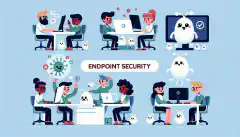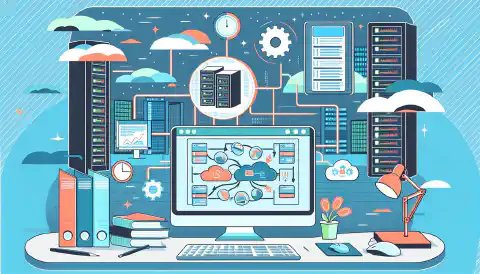Secure Your Remote Workforce: The Ultimate Endpoint Security Guide for Robust Protection

Table of Contents
The Ultimate Guide to Endpoint Security for Remote Teams
Endpoint security is crucial for remote teams to protect their devices and data from various threats. As remote work becomes more prevalent, it is essential to understand the importance of endpoint security and implement best practices to ensure a secure work environment. This guide covers the key concepts of endpoint security for remote teams, including common threats, choosing the right solutions, implementing security measures, addressing challenges, and future trends. By following the recommendations in this guide, remote teams can enhance their endpoint security and safeguard their sensitive information.
Key Takeaways
- Endpoint security is essential for remote teams to protect their devices and data from threats.
- Common threats to endpoint security in remote teams include phishing attacks, malware, and unsecured Wi-Fi networks.
- Selecting the right endpoint security solutions involves considering factors such as scalability, ease of use, and compatibility with remote work environments.
- Implementing a strong endpoint security policy, providing training to remote teams, and regularly monitoring and managing endpoint security are crucial for maintaining a secure remote work environment.
- Securing personal devices, managing security risks in BYOD policies, and protecting data and privacy are key challenges in remote work that need to be addressed.
Understanding Endpoint Security for Remote Teams
The Importance of Endpoint Security in Remote Work
As a cybersecurity expert, it is crucial to understand the importance of endpoint security in remote work. With the increasing number of remote teams, the endpoints, which include laptops, smartphones, and other devices, become the primary targets for cyberattacks. Endpoint security refers to the measures and strategies implemented to protect these endpoints from unauthorized access, data breaches, and other security threats.
- Remote work introduces new vulnerabilities and risks to an organization’s network and data. Cybercriminals take advantage of the less secure home networks and personal devices used by remote workers to gain unauthorized access to sensitive information.
- A successful endpoint security strategy is essential for maintaining the confidentiality, integrity, and availability of data in a remote work environment.
- Endpoint security helps prevent data loss, malware infections, and unauthorized access to corporate resources.
Tip: Regularly update and patch all endpoint devices to ensure they have the latest security features and protections.
Implementing a comprehensive endpoint security solution is crucial for remote teams to mitigate the risks associated with remote work. This includes using antivirus software, firewalls, encryption, and multi-factor authentication to protect endpoints and secure data transmission.
- Antivirus software scans and detects malicious software and threats on endpoints, preventing them from causing harm.
- Firewalls act as a barrier between the endpoint and the network, monitoring and controlling incoming and outgoing network traffic.
- Encryption ensures that data transmitted between endpoints and servers is secure and unreadable to unauthorized individuals.
- Multi-factor authentication adds an extra layer of security by requiring users to provide multiple forms of identification to access sensitive information.
By implementing these endpoint security measures, remote teams can significantly reduce the risk of data breaches, cyberattacks, and unauthorized access. It is essential for organizations to prioritize endpoint security to protect their valuable data and maintain the trust of their remote workforce.
Common Threats to Endpoint Security in Remote Teams
As a cybersecurity expert, it is crucial to understand the common threats that target remote users. Remote work introduces unique challenges and vulnerabilities that cybercriminals exploit to gain unauthorized access to sensitive information. By being aware of these threats, organizations can implement effective endpoint security measures to protect their remote teams and data.
Best Practices for Endpoint Security in Remote Work
As a cybersecurity expert, it is crucial to implement best practices for endpoint security in remote work to protect sensitive data and mitigate potential threats. By following these guidelines, remote teams can ensure a secure work environment:
Use strong and unique passwords: Encourage remote team members to create strong passwords that include a combination of uppercase and lowercase letters, numbers, and special characters. Additionally, emphasize the importance of using unique passwords for each online account.
Enable multi-factor authentication (MFA): Implement MFA for all remote team members to add an extra layer of security. This requires users to provide additional verification, such as a code sent to their mobile device, in addition to their password.
Keep software and devices up to date: Regularly update operating systems, applications, and security software to ensure they have the latest security patches and bug fixes.
Encrypt sensitive data: Utilize encryption techniques to protect sensitive data both in transit and at rest. This ensures that even if data is intercepted, it remains unreadable.
Tip: Regularly educate remote team members about the importance of these best practices and provide resources for password management tools and secure file sharing platforms.
By implementing these best practices, remote teams can significantly reduce the risk of security breaches and protect their valuable data.
Choosing the Right Endpoint Security Solutions

Key Considerations for Selecting Endpoint Security Solutions
As a cybersecurity expert, when selecting endpoint security solutions for remote teams, there are several key considerations to keep in mind:
Compatibility: Ensure that the chosen solution is compatible with the operating systems and devices used by remote team members. This includes compatibility with both Windows and macOS, as well as mobile devices such as smartphones and tablets.
Scalability: Consider the scalability of the solution to accommodate the growing needs of the remote team. The solution should be able to handle an increasing number of endpoints without compromising performance or security.
Ease of Deployment: Look for solutions that are easy to deploy and manage remotely. Remote teams often require solutions that can be quickly deployed without the need for physical access to devices.
Centralized Management: Opt for solutions that offer centralized management capabilities. This allows for easier monitoring, configuration, and enforcement of security policies across all endpoints.
Threat Detection and Response: Choose solutions that provide robust threat detection and response capabilities. Look for features such as real-time monitoring, behavior analysis, and incident response automation.
Integration: Consider the integration capabilities of the solution with other security tools and systems already in use by the organization. Integration can enhance overall security posture and streamline management processes.
Vendor Reputation: Research and evaluate the reputation of the endpoint security solution vendor. Look for vendors with a proven track record in the industry and positive customer reviews.
Remember, selecting the right endpoint security solution is crucial for protecting remote teams from cyber threats and ensuring the confidentiality, integrity, and availability of sensitive data.
Types of Endpoint Security Solutions for Remote Teams
When it comes to endpoint security solutions for remote teams, there are several options to consider. These solutions are designed to protect the endpoints, such as laptops, smartphones, and tablets, that remote team members use to access company resources. Endpoint protection platforms (EPPs) are one type of solution that provide a comprehensive approach to endpoint security. EPPs typically include features such as antivirus, firewall, and intrusion detection systems to detect and prevent various types of threats. Another type of solution is endpoint detection and response (EDR) tools, which focus on detecting and responding to advanced threats that may bypass traditional security measures. EDR tools often use behavioral analysis and machine learning algorithms to identify suspicious activities and take appropriate actions.
Comparing Different Endpoint Security Solutions
When comparing different endpoint security solutions, it is important to consider various factors that can impact the effectiveness and suitability of the solution for remote teams. Security advice for IT admins is crucial in making an informed decision . Here are some key points to consider:
- Features and capabilities: Evaluate the features and capabilities of each solution to ensure they align with the specific security needs of your remote team.
- Integration and compatibility: Assess the compatibility of the solution with your existing IT infrastructure and other security tools to ensure seamless integration.
- Scalability: Consider the scalability of the solution to accommodate the growing needs of your remote team.
- Ease of use: Look for a solution that is user-friendly and easy to deploy, manage, and maintain.
It is also recommended to consult with cybersecurity experts or seek recommendations from trusted sources to gain insights into the performance and reliability of different endpoint security solutions.
Implementing Endpoint Security Measures for Remote Teams

Creating a Strong Endpoint Security Policy
A strong endpoint security policy is crucial for remote teams to protect their devices and data from potential threats. It sets guidelines and standards for employees to follow, ensuring a consistent and secure approach to endpoint security. By implementing a strong policy, organizations can mitigate risks and prevent unauthorized access to sensitive information. Here are some key considerations for creating an effective endpoint security policy:
Training Remote Teams on Endpoint Security
Training remote teams on endpoint security is crucial for maintaining a secure work environment. By providing comprehensive training, organizations can ensure that employees understand the importance of secure data and networks and are equipped with the knowledge and skills to protect sensitive information . Here are some key considerations for training remote teams on endpoint security:
Monitoring and Managing Endpoint Security
Monitoring and managing endpoint security is crucial for remote teams to ensure the protection of sensitive data and prevent security breaches. It involves the continuous monitoring of endpoints, such as laptops, smartphones, and tablets, to detect and respond to any potential threats or vulnerabilities. By effectively monitoring and managing endpoint security, organizations can proactively identify and address security issues before they escalate into major incidents.
Addressing Endpoint Security Challenges in Remote Work

Securing Personal Devices in a Remote Work Environment
As a cybersecurity expert, securing personal devices in a remote work environment is a critical aspect of endpoint security. With employees using their own devices to access company resources, it is essential to implement robust measures to protect sensitive data and prevent unauthorized access.
To ensure the security of personal devices in a remote work environment, consider the following best practices:
- Enforce strong password policies: Require employees to use complex passwords and enable multi-factor authentication to add an extra layer of security.
- Implement device encryption: Encrypting personal devices helps safeguard data in case of loss or theft.
- Regularly update software and applications: Keeping devices and applications up to date ensures they have the latest security patches and fixes.
- Enable remote wipe and lock features: In the event of a lost or stolen device, remote wipe and lock capabilities allow for the secure erasure of data and prevention of unauthorized access.
By following these best practices, organizations can significantly reduce the risk of data breaches and unauthorized access to company resources on personal devices in a remote work environment.
Managing Security Risks in BYOD (Bring Your Own Device) Policies
Managing security risks in BYOD policies is crucial for remote teams. BYOD policies allow employees to use their personal devices for work purposes, which can introduce various security vulnerabilities. To mitigate these risks, organizations should implement strong security measures and educate employees on best practices. Cybersecurity awareness programs can play a significant role in promoting a culture of security and ensuring that employees are aware of the potential risks and how to protect against them.
Protecting Data and Privacy in Remote Work
As a cybersecurity expert, protecting data and privacy in remote work is of utmost importance. Remote work introduces unique challenges and risks to the security of sensitive information. It is crucial for organizations to implement robust measures to safeguard data and maintain privacy.
One effective way to protect data in remote work is to encrypt all sensitive information. Encryption ensures that data is transformed into a format that is unreadable without the appropriate decryption key. This adds an extra layer of security, especially when data is transmitted over unsecured networks.
Another important aspect of protecting data and privacy is to establish strong access controls. This includes implementing multi-factor authentication, role-based access control, and regular password updates. By limiting access to sensitive data, organizations can reduce the risk of unauthorized access and data breaches.
In addition to encryption and access controls, organizations should also regularly backup their data. This ensures that in the event of a security incident or data loss, important information can be restored. Backup data should be stored securely and separate from the primary data to prevent both physical and logical damage.
To further enhance data and privacy protection, organizations should educate their remote teams on best practices for handling sensitive information. This includes training on identifying phishing attempts, using secure communication channels, and avoiding the use of public Wi-Fi networks for work-related tasks.
Lastly, organizations should monitor and audit their remote teams’ activities to detect any suspicious behavior or potential security breaches. This can be done through the use of endpoint security solutions that provide real-time monitoring and threat detection capabilities.
By implementing these measures, organizations can significantly reduce the risk of data breaches and protect the privacy of their remote teams.
Future Trends in Endpoint Security for Remote Teams

Emerging Technologies for Endpoint Security
As technology continues to advance, new emerging technologies are being developed to enhance endpoint security for remote teams. These technologies offer innovative solutions to address the evolving cybersecurity landscape and protect organizations from sophisticated threats. One such technology is machine learning, which can analyze large amounts of data to detect and prevent malicious activities. By leveraging machine learning algorithms, organizations can identify anomalies and patterns that may indicate a potential security breach.
The Role of Artificial Intelligence in Endpoint Security
Artificial Intelligence (AI) plays a crucial role in enhancing endpoint security for remote teams. By leveraging AI technologies, organizations can effectively detect and respond to emerging threats in real-time. Machine learning algorithms enable AI systems to continuously learn and adapt to new attack vectors, making them more resilient against evolving cyber threats.
AI-powered endpoint security solutions offer several benefits for remote teams:
- Automated threat detection: AI algorithms can analyze vast amounts of data from endpoints, network traffic, and user behavior to identify patterns and anomalies indicative of malicious activities.
- Faster incident response: AI systems can rapidly analyze and correlate data to detect and respond to security incidents, reducing the time between detection and remediation.
- Reduced false positives: AI algorithms can accurately distinguish between legitimate user activities and suspicious behavior, minimizing the number of false alarms that require manual investigation.
To illustrate the impact of AI in endpoint security, consider the following table that compares the effectiveness of AI-powered solutions versus traditional signature-based antivirus software:
| Metric | AI-Powered Solutions | Traditional Antivirus |
|---|---|---|
| Detection Rate | High | Moderate |
| False Positive Rate | Low | High |
| Response Time | Rapid | Slow |
In addition to these benefits, AI can also assist in automating security policy enforcement and predictive threat intelligence, enabling organizations to proactively address potential vulnerabilities and stay ahead of cyber threats.
Tip: When implementing AI-powered endpoint security solutions, it is important to ensure regular updates and maintenance of AI models to keep up with emerging threats and maintain optimal performance.
In conclusion, AI is revolutionizing endpoint security for remote teams by providing advanced threat detection, faster incident response, and reduced false positives. By harnessing the power of AI, organizations can enhance their security posture and protect their remote workforce from evolving cyber threats.
Adapting Endpoint Security to Evolving Remote Work Practices
As remote work becomes more prevalent, it is crucial for organizations to adapt their endpoint security measures to the changing landscape. The shift to a remote work environment introduces new challenges and vulnerabilities that need to be addressed to ensure a safeguarded digital workplace. Here are some key considerations for adapting endpoint security to evolving remote work practices:
Future Trends in Endpoint Security for Remote Teams
Conclusion
In conclusion, endpoint security is of utmost importance for remote teams. As the number of remote workers continues to rise, so does the need for robust endpoint security measures. This article has provided a comprehensive guide to understanding endpoint security for remote teams, including the importance of endpoint security in remote work, common threats faced by remote teams, and best practices for ensuring endpoint security. Additionally, it has discussed the process of choosing the right endpoint security solutions, highlighting key considerations and comparing different options available. Implementing effective endpoint security measures, such as creating a strong endpoint security policy, training remote teams, and monitoring and managing endpoint security, is crucial for safeguarding sensitive data and protecting against potential cyber threats. Furthermore, this article has addressed the challenges associated with endpoint security in remote work, such as securing personal devices and managing security risks in BYOD policies. It has also explored future trends in endpoint security, including emerging technologies and the role of artificial intelligence. As remote work practices continue to evolve, it is essential for organizations to adapt their endpoint security strategies accordingly. By staying informed about the latest trends and implementing robust endpoint security measures, remote teams can ensure the safety and integrity of their data and systems. Endpoint security is a critical component of a comprehensive cybersecurity strategy, and organizations must prioritize it to mitigate the risks associated with remote work.
Frequently Asked Questions
What is endpoint security?
Endpoint security refers to the measures and solutions implemented to protect the various endpoints, such as laptops, desktops, mobile devices, and servers, from cyber threats and unauthorized access.
Why is endpoint security important for remote teams?
Endpoint security is crucial for remote teams as it helps protect sensitive data and prevent security breaches, ensuring the confidentiality, integrity, and availability of information even when employees are working outside the traditional office environment.
What are the common threats to endpoint security in remote teams?
Common threats to endpoint security in remote teams include malware attacks, phishing attempts, insecure Wi-Fi networks, unsecured personal devices, and social engineering tactics.
What are the best practices for endpoint security in remote work?
Some best practices for endpoint security in remote work include using strong and unique passwords, regularly updating software and applications, implementing multi-factor authentication, encrypting sensitive data, and educating employees about cybersecurity risks.
How can remote teams choose the right endpoint security solutions?
When choosing endpoint security solutions, remote teams should consider factors such as the level of protection offered, ease of use, compatibility with different operating systems, scalability, and cost.
What are the different types of endpoint security solutions for remote teams?
Common types of endpoint security solutions for remote teams include antivirus software, firewalls, intrusion detection systems, virtual private networks (VPNs), and endpoint detection and response (EDR) tools.






